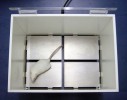Authors
T. Scheikl, B. Pignolet, C. Dalard, S. Desbois, D. Raison et al.
Lab
INSERM, U1043, Toulouse, France.
Journal
The Journal of Immunology
Abstract
An increasing number of neurologic diseases is associated with autoimmunity. The immune effectors contributing to the pathogenesis of such diseases are often unclear. To explore whether self-reactive CD8 T cells could attack CNS neurons in vivo, we generated a mouse model in which the influenza virus hemagglutinin (HA) is expressed specifically in CNS neurons. Transfer of cytotoxic anti-HA CD8 T cells induced an acute but reversible encephalomyelitis in HA-expressing recipient mice. Unexpectedly, diabetes insipidus developed in surviving animals. This robust phenotype was associated with preferential accumulation of cytotoxic CD8 T cells in the hypothalamus, upregulation of MHC class I molecules, and destruction of vasopressin-expressing neurons. IFN-_ production by the pathogenic CD8 T cells was necessary for MHC class I upregulation by hypothalamic neurons and their destruction. This novel mouse model, in combination with related human data, supports the concept that autoreactive CD8 T cells can trigger central diabetes insipidus.
BIOSEB Instruments Used:
Aron Test or Four Plates Test (LE830),Rotarod (BX-ROD)

 Pain - Thermal Allodynia / Hyperalgesia
Pain - Thermal Allodynia / Hyperalgesia Pain - Spontaneous Pain - Postural Deficit
Pain - Spontaneous Pain - Postural Deficit Pain - Mechanical Allodynia / Hyperalgesia
Pain - Mechanical Allodynia / Hyperalgesia Learning/Memory - Attention - Addiction
Learning/Memory - Attention - Addiction Physiology & Respiratory Research
Physiology & Respiratory Research
 Pain
Pain Metabolism
Metabolism Motor control
Motor control Neurodegeneration
Neurodegeneration Cross-disciplinary subjects
Cross-disciplinary subjects Muscular system
Muscular system General activity
General activity Mood Disorders
Mood Disorders Other disorders
Other disorders Joints
Joints Central Nervous System (CNS)
Central Nervous System (CNS) Sensory system
Sensory system

